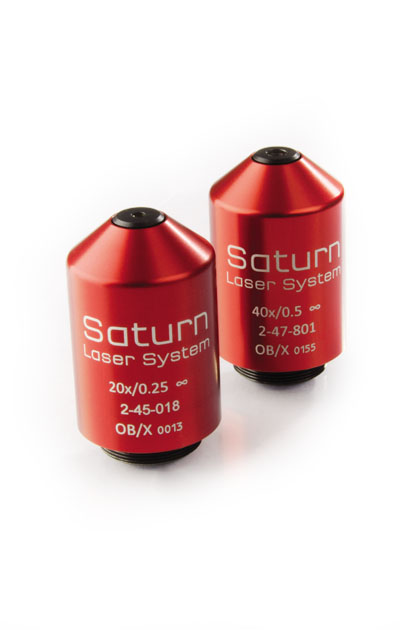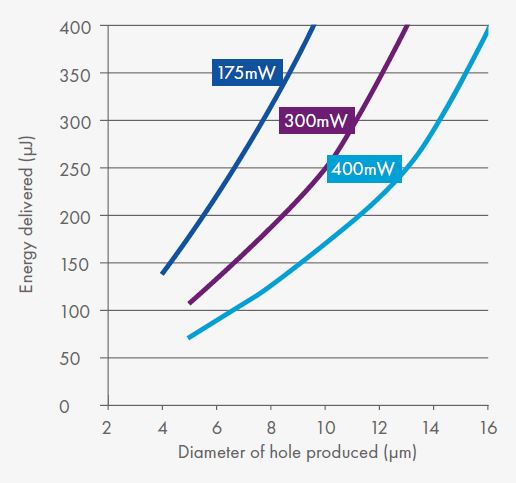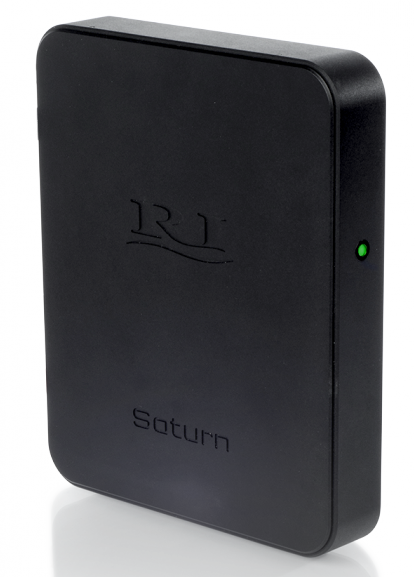RI Saturn 5TM
Fixed and Directional Laser Systems
As the pioneer of moveable lasers for Assisted Reproductive Technology, the RI Saturn 5 Active™ laser is spearheading a revolution in hatching and biopsy techniques in laboratories all over the world.
The RI Saturn 5™ Biopsy Mode is helping you to significantly improve biopsying methods; potentially reducing procedure time, lowering the incidence of blastocyst collapse and eliminating the need to mechanically tear off cells.
Using Biopsy Mode, you can draw a straight or curved line along the sample, select the number and size of holes, then simply “fire”. The laser will ablate exactly along the chosen path, meaning you no longer need to move the holding pipette at all. It is that easy.
Availability
This product is available for sale in the U.S.A and selected countries in Europe and the rest of the world.
“We have been using the RI Saturn 5 Active™ laser system for assisted hatching, blastomere biopsy and blastocyst collapsing since November 2012. The moveable RI Saturn™ laser means I can ablate the zona exactly where I want to, without having to move the embryo, also the new biopsy mode allows me to accurately make holes in either straight or curved lines along the zona. The new laser system from RI makes the procedures quicker, easier and safer to perform than ever before. We love it!”
Samantha Knight, SPIRE London Fertility Clinic, UK

Key Features
Faster Biopsies
Biopsy mode allows accurate laser drilling along a straight or curved drawn line
Excellent Accuracy
Excellent accuracy and unique computer controlled laser with guaranteed laser alignment
Safest Lasers on the Market
Lowest laser pulse energy for minimal energy near critical cells. Exclusion Zone™ feature ensures cell safety
Intuitive Software
Intuitive RI Viewer software package with streamlined interface. Programmable foot pedal controls software and laser functions including the new biopsy mode
Versatile
Compatible with all popular brands of micromanipulators and inverted microscopes
RI Saturn 5TM – Totally Committed To Embryo Safety
Multiple safety features reassure you that the RI Saturn 5™ laser is the safest laser on the market.
To keep your embryos safe, features include the Exclusion Zone which can be set according to distance or temperature.
By employing a higher laser power, the RI Saturn 5™ laser applies less total energy to make a specified hole size, in comparison to lower power laser systems.

Biopsy Videos Using Our RI Saturn 5 Laser System
Applications*
Using RI Saturn 5 Active™, you will find the following procedures are almost effortless and can be performed quickly and accurately. These procedures may require difficult embryo manipulation when performed using fixed lasers.
Using a RI Saturn 5 Active™ has clear advantages to the welfare of the embryo.
Blastomere Biopsy, Polar Body Biopsy, Blastocyst Collapsing (for vitrification)
The RI Saturn 5 Active™ directional laser allows the embryo to stay in the desired position and focus so that ablations can be made wherever required without additional manipulation. Our Biopsy Mode also allows safe multi-pulse drilling along a predetermined line.
Assisted Hatching
The directional laser means that accurate ablations can be made without the need to hold the embryo, making it very quick and accurate, with no additional consumable costs.
*The applicability of procedures is dependent on the regulations of the country into which the device is sold.
Blastocyst/Trophectoderm Biopsy
The RI Saturn 5 Active™ is unparalled in its ease of use.
The directional laser allows the user to make multiple ablations across the trophectoderm cells without needing to move the blastocyst.
This gives the user superb accuracy, safety and incredible speed.
Product Specifications
| Pilot Laser | 630-650nm spot targeting solid state diode laser – red pilot beam guarantees the position of the invisible ablation laser. It is impossible for the pilot and ablation lasers to be out of alignment with each other |
| Objective | Custom designed objective for optimum laser transmission, crystal clear imaging and minimal laser pulse times. Tested and proven not to exhibit astigmatism with RI Saturn 5™ Laser Systems. 20x and 40x objectives are available |
| Ablation Laser | 1480nm / 400mW solid state diode laser. Pulse length range 0.005-2.0ms / 5-2000µs. Class 1 laser product. Tested and proven not to exhibit thermal lensing |
| Laser unit dimensions: (WxDxH) | 220mm x 180mm x 34mm |
| CRi Oosight™ Compatibility | Compatible with CRI Oosight™ and SpindleView™ systems |
| Fluorescence Compatibility | RI Saturn™ Lasers Systems are compatible with epi-fluorescence on selected microscopes. Contact us for details |
| Operation Software | RI Viewer™ imaging software included – with digital laser targeting |
| PC System Requirements | Operating systems: Windows 10, Windows 11 |
| Mains Input | 100-240VAC, 50-60Hz |
Order Codes
Please use the table below to select the correct part number for your equipment.
For Saturn Fixed , other microscopes and any other system not covered by the part numbers below, contact RI Orders by emailing [email protected]
| Microscope Manufacturer | Model | Stage | Objective Choice | Part Number | Description |
|---|---|---|---|---|---|
| Nikon | Ti2 | Integra 3™, Integra Ti | 40x | 6-47-500-25 | RI Saturn 5 Active Nikon Ti2 with Integra 40x |
| Nikon | Ti2 | Nikon XY | 40x | 6-47-500-26 | RI Saturn 5 Active Nikon Ti2 with Nikon XY Stage 40x |
| Nikon | Ti2 | Integra 3™, Integra Ti | 20x | 6-47-500-27 | RI Saturn 5 Active Nikon Ti2 with Integra 20x |
| Nikon | Ti2 | Nikon XY | 20x | 6-47-500-28 | RI Saturn 5 Active Nikon Ti2 with Nikon XY Stage 20x |
| Nikon | Ti-S, Ti-U, Ti-E | Integra 3™, Integra Ti | 40x | 6-47-500-01 | RI Saturn 5 Active Nikon Ti with Integra 40x |
| Nikon | Ti-S, Ti-U, Ti-E | Nikon XY | 40x | 6-47-500-02 | RI Saturn 5 Active Nikon Ti with Nikon XY Stage 40x |
| Nikon | Ti-S, Ti-U, Ti-E | Integra 3™, Integra Ti | 20x | 6-47-500-04 | RI Saturn 5 Active Nikon Ti with Integra 20x |
| Nikon | Ti-S, Ti-U, Ti-E | Nikon XY | 20x | 6-47-500-05 | RI Saturn 5 Active Nikon Ti with Nikon XY Stage 20x |
| Nikon | TE2000 | Integra 3™, Integra Ti | 40x | 6-47-500-19 | RI Saturn 5 Active Nikon TE2000 with Integra 40x |
| Nikon | TE2000 | Nikon XY | 40x | 6-47-500-20 | RI Saturn 5 Active Nikon TE2000 with Nikon XY Stage 40x |
| Nikon | TE2000 | Integra 3™, Integra Ti | 20x | 6-47-500-21 | RI Saturn 5 Active Nikon TE2000 with Integra 20x |
| Nikon | TE2000 | Nikon XY | 20x | 6-47-500-22 | RI Saturn 5 Active Nikon TE2000 with Nikon XY Stage 20x |
| Nikon | TE300 | – | 40x | 6-47-500-17 | RI Saturn 5 Active Nikon TE300 40x |
| Nikon | TE300 | – | 20x | 6-47-500-18 | RI Saturn 5 Active Nikon TE300 20x |
| Nikon | Diaphot 200/300 | – | 40x | 6-47-500-23 | RI Saturn 5 Active Nikon Diaphot 200/300 40x |
| Olympus | IX53, IX73, IX83 | – | 40x | 6-47-500-03 | RI Saturn 5 Active Olympus IX3 40x |
| Olympus | IX53, IX73, IX83 | – | 20x | 6-47-500-06 | RI Saturn 5 Active Olympus IX3 20x |
| Olympus | IX51, IX71, IX81 | Left-hand Motor1 | 40x | 6-47-500-13 | RI Saturn 5 Active Olympus IX2 40x LH Motor |
| Olympus | IX51, IX71, IX81 | Left-hand Motor1 | 20x | 6-47-500-14 | RI Saturn 5 Active Olympus IX2 20x LH Motor |
| Olympus | IX51, IX71, IX81 | Right-hand Motor1 | 40x | 6-47-500-15 | RI Saturn 5 Active Olympus IX2 40x RH Motor |
| Olympus | IX51, IX71, IX81 | Right-hand Motor1 | 20x | 6-47-500-16 | RI Saturn 5 Active Olympus IX2 20x RH Motor |
| Olympus | IX50, IX70 | – | 40x | 6-47-500-24 | RI Saturn 5 Active Olympus IX1 40x |
| Leica | DMi8 | – | 40x | 6-47-500-07 | RI Saturn 5 Active Leica DMi8 40x |
| Leica | DMi8 | – | 20x | 6-47-500-08 | RI Saturn 5 Active Leica DMi8 20x |
| Zeiss | Axio Observer | Left-hand Motor1 | 40x | 6-47-500-09 | RI Saturn 5 Active Zeiss Axio Observer 40x LH Motor |
| Zeiss | Axio Observer | Right-hand Motor1 | 20x | 6-47-500-10 | RI Saturn 5 Active Zeiss Axio Observer 20x LH Motor |
| Zeiss | Axio Observer | Right-hand Motor1 | 40x | 6-47-500-11 | RI Saturn 5 Active Zeiss Axio Observer 20x RH Motor |
| Zeiss | Axio Observer | Right-hand Motor1 | 20x | 6-47-500-12 | RI Saturn 5 Active Zeiss Axio Observer 20x RH Motor |
1Choose left or right according to XY stage handle position. The motor should normally be opposite the stage handle.
All systems are supplied with four mains cables: UK, EU (CEE 7/7), USA and China/Australia

 My Clinic is in the United States
My Clinic is in the United States My Clinic is in Canada
My Clinic is in Canada
